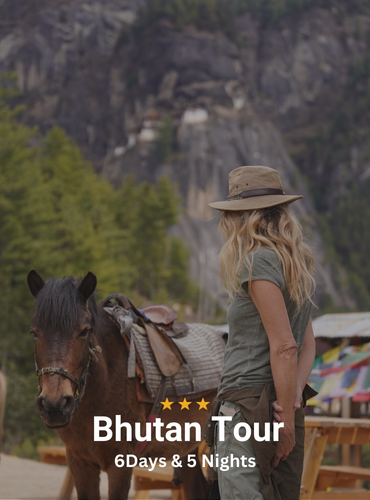Yes, all international visitors (except for citizens of India, Bangladesh, and the Maldives) require a visa to visit Bhutan. The visa must be arranged through a licensed Bhutanese travel agency before arrival. Your travel agency will handle the visa process on your behalf.
You can book your trip to Bhutan through our travel agency by contacting us directly. We offer customized packages based on your travel preferences. Once you provide us with your details, we’ll create an itinerary and handle the visa process for you.
Bhutan has a daily minimum package rate, which includes accommodation, meals, transportation, a licensed tour guide, and entrance fees to tourist sites. The minimum daily tariff varies depending on the season, but the rate is generally higher during peak tourist seasons.
The best time to visit Bhutan is during the spring (March to May) and fall (September to November). These seasons offer clear skies, pleasant weather, and a great chance to experience Bhutan’s cultural festivals. Winter (December to February) can be cold, while summer (June to August) can bring rain.
While Bhutan can be more expensive compared to some neighboring countries, the daily tariff helps manage costs for tourists. Bhutan’s unique policy of "High Value, Low Impact Tourism" ensures that visitors experience the country's culture and natural beauty without causing harm to its environment. Your tariff covers most expenses, including accommodations, meals, and transportation.
No, independent travel is not allowed in Bhutan. All tourists must travel with an approved tour guide or as part of an organized tour. This helps the government regulate tourism and preserve the country’s culture and environment.
It’s advisable to pack comfortable clothing for outdoor activities, warm clothes for cooler regions, and formal or semi-formal attire for visiting monasteries or temples. Don’t forget your camera, sunscreen, and any personal medications. If you plan to trek, bring appropriate hiking gear.
Yes, Bhutan is generally considered a very safe destination for tourists. The country has low crime rates, and the locals are known for their hospitality. However, as with any destination, it’s important to take basic safety precautions, such as keeping an eye on your personal belongings.
While it’s not mandatory, we strongly recommend purchasing travel insurance before visiting Bhutan. Travel insurance can cover trip cancellations, medical emergencies, and lost luggage, providing peace of mind during your journey.
The official currency of Bhutan is the Bhutanese Ngultrum (BTN). However, Indian Rupees (INR) are also widely accepted. We recommend carrying both currencies or using ATM services in major towns.
Some of the must-visit sites in Bhutan include: Paro Taktsang (Tiger's Nest Monastery) – A breathtaking cliffside monastery. Punakha Dzong – One of Bhutan’s most beautiful and historically significant fortresses. Thimphu – The capital city, home to many cultural and historical sites. Phobjikha Valley – Famous for its scenic beauty and the black-necked cranes. Dochula Pass – Offers panoramic views of the Himalayas and 108 chortens.
Transportation within Bhutan is usually provided by your tour agency. You’ll travel in comfortable vehicles, accompanied by a licensed guide, to explore various regions. The roads in Bhutan are scenic but can be winding, so be prepared for some adventurous rides.
Most major towns and hotels offer Wi-Fi, but the quality of internet connections can be inconsistent in rural areas. Mobile coverage is generally good in urban areas, but it may be limited in more remote regions.
